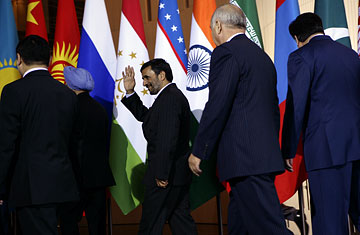
Iranian President Mahmoud Ahmadinejad, center, at a meeting of the Shanghai Cooperation Organization in Yekaterinburg, Russia, on June 16, 2009
On Tuesday, amid reports of escalating violence and protest across his country, Iranian President Mahmoud Ahmadinejad slipped into a plane and jetted off to Yekaterinburg, a Russian city nestled in the Ural mountains. Iran seethed in the aftermath of Ahmadinejad's disputed election victory last weekend even as foreign journalists were officially barred from reporting street protests a day after the largest demonstrations seen in Iran since the 1979 Islamic revolution. Meanwhile, the powerful Guardian Council is investigating allegations of poll fraud, and has suggested a partial recount — a solution main opposition leader Mir-Hossein Mousavi has rejected. So why has the hard-line President — so confident in his electoral triumph and dismissive of his detractors — quit town?
The short answer is: because he was invited. Russia is convening two back-to-back summits of significant global importance this week. Moscow is a key player in both the Shanghai Cooperation Organization (SCO), a Chinese-driven body aimed at improving ties with Russia and Central Asia, and the so-called BRIC group — a gang of four emerging world powers in Brazil, Russia, India and China. With the SCO and BRIC meeting at the same place, much of the non-Western world's geopolitical muscle is now rubbing shoulders in the shadow of the Urals. And the Iranian President, who never shies from making bold pronouncements, was not going to miss an opportunity to let loose his usual rhetorical flair. Soon after landing, Ahmadinejad launched a broadside at the fortunes of the West, especially America's, in the wake of the ravages of the global recession and the military quagmires in Iraq and Afghanistan. "It is absolutely obvious that the age of empires has ended," said Ahmadinejad, "and its revival will not take place."
What the Iranian President thinks will emerge in its place is far less obvious. The SCO, in particular, has been perceived since its founding in 2001 as a growing foil to U.S. interests in West Asia. Originally formed to develop dialogue on trade and security issues among nations with old histories of enmity, the SCO comprises China, Russia and four Central Asian states hovering within both Beijing and Moscow's spheres of influence — Uzbekistan, Kazakhstan, Tajikistan and Kyrgyzstan. Tehran under Ahmadinejad had long petitioned to be part of this group but has settled for "observer" status alongside India and Pakistan.
In the past, the SCO has worked to stave off the threat of Islamist militancy in Central Asia, but it declared in 2005 that all U.S. military bases in the region's post-Soviet republics must have a timeline for withdrawal — a move on both Beijing and Moscow's part to stymie U.S. influence. Already, the U.S.'s pivotal Manas air base in Kyrgyzstan has been ordered to cease operations.
Some Western analysts see the SCO's rise as a rival bloc to NATO, though these fears are, in the present climate, likely overblown. Beijing and Moscow regard each other with equal measures of warmth and distrust. The Central Asian countries tagging along are also keen to pit the Chinese and Russians against each other in a global scramble for the vast reserves of natural resources lurking beneath the region's rolling steppe and in the Caspian Sea. Still, in the U.N. Security Council, China and Russia have presented something of a united front when it comes to Iran. Their combined weight has thwarted the West from levying stricter sanctions upon Tehran as it continues its quest for nuclear weaponry.
Under Ahmadinejad, Iranian foreign policy has been cultivating a "look east" strategy, securing greater links with its historical neighborhood as governments in Tel Aviv and Washington dial up the heat. In his election campaign, the Iranian President trumpeted his ability to make Iran a leading global power, and he urged those assembled in Yekaterinburg to pursue more coordinated action and policy, like the formation of a joint regional bank in Eurasia. "Taking collective decisions on politics, economics and culture," Ahmadinejad opined, "will facilitate stabilization of the situation in all the countries."
Further negotiations may achieve more concrete results. While India in recent years has found common cause with the U.S. in its execution of the war on terrorism, Iran is still keen to boost its long-standing friendship with New Delhi. A mooted gas pipeline, running from Iran's fields through Afghanistan and into Pakistan and India, is a massive project that appeals to all parties involved. Conversation in Yekaterinburg will surely include the need to shore up the region's economies — China has already promised a $10 billion soft loan to its SCO allies, including Russia, which has been hit particularly hard by the fallout of the world's financial crisis. Few will raise thornier questions of political reform. After all, Russian President Dmitri Medvedev and his Chinese counterpart, Hu Jintao, can hardly hold the moral high ground and chide Ahmadinejad for jury-rigging the democratic process.
On Twitter and in the blogosphere, where the furor in Iran is unfolding before a rapt global public, hundreds have ridiculed the Iranian President for leaving the country at this moment. Some have likened his departure to a flight 30 years ago, when, heeding the bells of history, the country's teary-eyed Shah strode onto a plane bound for Egypt, never to return as Islamic revolution swept the monarchy aside. But Ahmadinejad will be back, buoyed, if not by a democratic mandate, then by the assurances of a few close friends.
